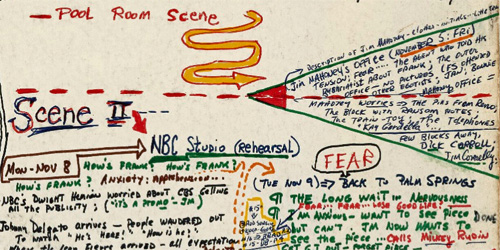My wife has been ill.
This essay was supposed to be finished days ago but my wife has been ill. I have spent more time with the baby. Babies prefer monkeys that rattle to essays about Nonfiction heavyweights. Progress has been slow.
Without Gay Talese, it is arguable that I couldn’t have started this piece as I did. One of the very first journalists to bring the reporter into the story, his writing for Esquire magazine was as much about the finding of the story as the telling. He changed forever the balance between interviewer and interviewee. His 1966 article, Frank Sinatra Has a Cold*, shows this style in extremis, he never actually speaks to Sinatra during the article. The essay is almost travel writing, with the strange trappings of fame and Sinatra’s near universal visibility the foreign land explored, the moment of Talese’s visit carefully chosen to best show his subject’s vulnerability. Fame after all is merely a metaphor for mortality; the star, the writer, the writing, we all share that.
After Talese the writer could never be invisible again, or maybe they could. I don’t know. It probably doesn’t matter. It sounds good anyway. I’m not really qualified to tell you how big an impact his work had on journalism. For a start I haven’t slept that well in three months, what with the baby, but more importantly I am always a bit wary of Big Bold Claims about people being the first to do something. One of you will know about somebody who wrote something at some point that changed everything for everybody two months before Talese was born. Fine. He is a big cheese in New Journalism. That’s enough for me. That should be enough for anybody.
Really, I’m not joking about needing to sleep. I can tell you why I love his writing. Is that enough? It is going to have to be. Sorry.
I love his prose, I love that he writes about people not just when they are at the peak of their careers but also later, often much later, and I love that he wrote brilliant nonfiction pieces about sport and about athletes. I love that he wrote about Joe Louis, not as heavyweight champion of the world but:
“at a time when he weighs 240 pounds, is going bald, is somewhat less than prosperous, and no longer possesses the quick reflexes either to hit or pick up checks.”
Talese began his writing career as a sports reporter and the subject has never lost its appeal for him (Talese is 81 and still writing). Sport, he has said, “is about people who lose and lose and lose.” For Talese it is the life, as well as the career, of the athlete that should interest us. This can be seen as an opposite stance to a postmodernist one that sees the text (in this case the sporting event) as being separate from the life – but all writers know that that separation is false.
Many of you will not be happy at my referring to a sporting event as a text. In Britain we are wary of writing about sport. Here, writing is high culture, sport is low culture. It is no surprise then that Talese’s essays about DiMaggio, Joe Louis and Floyd Patterson are not very well known here. Americans recognise that sport is a mirror to society and a part of a country’s culture, not beneath it. They also make better sandwiches than us, but that is a different story. Sport is built on dreams and dreams are what have fuelled America’s progress. Sandwiches are built on bread that isn’t sliced in a factory, but that is a different story. I can’t dwell on sandwiches. I really can’t. I need to finish this. I need to go to bed.
But would it kill people to put a pickle on the side? Really? Actually kill them?
Go to a book shop, or that there internet site (you know the one) and buy a copy of Frank Sinatra Has a Cold and Other Essays by Gay Talese. Read about fame and sport and fading brilliance. Learn to embrace sport or, at the very least, great prose about sport. Demand a better sandwich. Come and do some babysitting for me.
My wife has been unwell.
Benjamin Judge is a Manchester based writer. You can read some of his fiction at Very Short Stories about Very Good Writers, some of his nonfiction at The Complete Everything, and some of his postcards to David Cameron at Postcards to David.
*The illustration is a detail from the diagram Talese wrote for the working outline of the essay Frank Sinatra Has a Cold, on a piece of shirtboard. We found it over here.

